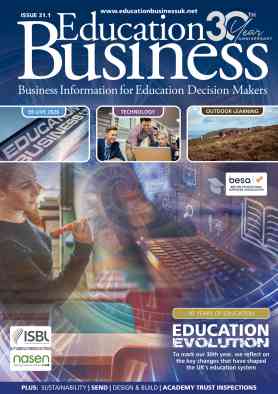The role of technology and ICT in Primary and Secondary education
 Technology and ICT have been drivers that have re-engineered our society and commerce in recent years. Some might say they have presented opportunities for change that have lead to unique benefits. Just as in any market, we have seen both pioneers and early adopters and, at the opposite end of the spectrum those schools that are slow and reluctant to accept change.
Technology and ICT have been drivers that have re-engineered our society and commerce in recent years. Some might say they have presented opportunities for change that have lead to unique benefits. Just as in any market, we have seen both pioneers and early adopters and, at the opposite end of the spectrum those schools that are slow and reluctant to accept change.
Across England, Wales and Northern Ireland, the ICT Mark, administered by Naace, is a good indicator of the maturity achieved by schools in their use of ICT in Leadership and Management, Planning, Learning, Assessment, Professional Development and use of Resources. Over 2000 schools have achieved this quality mark and can demonstrate their effectiveness in their use of ICT delivering benefits to all aspects of school and student life and extending more broadly into the community.
No one can deny the impact that technology continues to have on almost every aspect of our daily lives, nor the speed with which new developments are adopted by us. The mobile phone is ubiquitous, and not just for anytime anywhere voice communication. Broadband data connectivity brings access to the internet and our personal and business communications. GPS can give us geographical guidance. A camera gives us video as well as image and sound recording capability, and local storage continues to get ever larger and ever cheaper.
With the introduction of “apps” we now have almost untold free or low cost support to use and manage the information to which we have access. With the developments in “Cloud” computing, and the expansion of the internet to “connected things” as well as people our access to, and use of information continues to evolve relentlessly.
Today it is the norm to use a range of personal data tools that specifically suit our needs. Tablet computers such as the iPad are popular for publications such as newspapers or books and magazines, delivered digitally. Along with laptops and MP3 players they offer us portability – anytime anywhere access.
Just as devices are now ubiquitous, with the connectivity they offer, so too is access to knowledge. It is now commonplace to use technology socially to communicate, collaborate, elicit and offer opinion, share ideas and to use Web 2.0 and Web 3.0 technologies to build knowledge. These are the skills our young people are developing, and according to Microsoft research presented at Bett 2011, these are the very same skills that employers are seeking from potential employees. This must surely be the context in which education operates? Many schools understand this and exploit technology effectively and in context, but many are still attempting to deliver success in the context of education structured in a bygone age. What should we be endeavouring to deliver in the 21st century?
We can now assume that via technology, much of knowledge is free and readily available. Learning facts from a particular text and demonstrating the ability to regurgitate those facts under controlled examination conditions doesn’t deliver what is needed. Tony Wagner in his book “The Global Achievement Gap” (2008) describes seven survival skills deliverable by 21st century learning. These are:
- Critical thinking and problem solving
- Collaboration across networks and leading by influence
- Agility and adaptability
- Initiative and entrepreneurialism
- Effective oral and written communication
- Accessing and analyzing Information
- Curiosity and imagination
These are all skills that are associated with proactive development and change and have clear links with how business and society have developed in recent years with ICT embedded throughout their operations. The importance of ICT to education as a sector is far greater than the consideration of ICT as a discrete knowledge based subject, and it should be seen as such.
How are schools embracing technology into their activities? Naace sees two types of school – those where technology is thoroughly embedded, and those where technology is available, but for various reasons is not being exploited fully. Schools that demonstrate effective and embedded use of ICT do transcend the knowledge based learning agenda. When staff and pupils are confident with skills and use, the ICT becomes much less important; it unobtrusively delivers effectiveness and efficiency so that for example, in teaching English the focus becomes the quality of creative writing, rather than the ability to word process. Schools have said that the use of good online teaching and revision resources can lift grades, for example in Mathematics by 0.5 or more.
The Organisation for Economic Co-operation and Development suggests that we live in a “Knowledge Economy”, but that we need to think carefully about what constitutes knowledge. It proposes four distinct types; “know what”, “know why”, “know how” and “know who”, and suggests there is growing demand for the latter three compared with the traditional curriculum of the “know what” category. Schools that are confident with technology are moving away from knowledge based curricula. Some Secondary schools have adopted programmes which focus on “Learning to learn” and “Enquiry based learning” which move learning away from simple subject knowledge to higher level thinking skills in all subjects. This is key to delivering what society and business want to see from our education system in the 21st century. It is not about excessive concentration on ICT skills per se, but allowing those skills to support the delivery of a much wider and more relevant curriculum.
During the “snow days” early in 2011 some schools fully exploited their learning platforms. Those who already had a culture of supporting students with anywhere, anytime learning kept students and parents fully informed of school closures or openings, and could operate almost as normal with learning materials and activities available from anywhere, ongoing student teacher communications and on-line submission of completed work. How common is it now for people in business to be able to continue with their mental, creative and communication related aspects of their business activities from home or elsewhere? There is no reason why a school’s intellectual activities should stop because access to the building might be interrupted. How many schools do we know that simply closed when the snow came? All schools should now have access to a learning platform and the functionality associated with it, and with the success of the Home Access project many more students have access to the internet, thus enabling greater levels of remote learning to take place.
Add to this the impact, such as that exemplified in research undertaken by Becta which demonstrated that where parental engagement with a child’s learning during primary years takes place, it can improve outcomes by as much as 50%, and therein lies a recipe for success.
Let us not forget that in this connected world we must do everything we can to ensure the safety of all learners. E-safety and Internet Literacy are essential subjects that we as a society ignore at our peril.
What does the future hold?
In terms of technology we are starting to see individuals using multiple devices in a variety of ways. The days of the ICT suite are starting to look numbered, other than perhaps for basic skills training and use in assessment. The technology is needed when and where the learning process takes place. The “Cloud” is becoming the home of the information repository and will deliver applications and programs to our devices as and when required. Devices will become cheaper. Applications will also become free or, because of higher volumes, will be available at lower cost. All this relies heavily on suitable infrastructure being available, but as we move to Digital TV, relatively high digital capacity will be available from the bandwidth released by analogue transmissions.
The internet of “connected things” is likely to have a big impact on our lives. By this we mean the online connectivity of systems, machines and sensors. Much of the technology already exists, but isn’t yet at sufficiently high volume and low cost to be pervasive. Empowering our educators and encouraging co-operation and collaboration across agencies should be fundamental. The technology exists to allow safe and secure sharing of information at local level and across agencies without the need to structure national sized data repositories. Information can be shared by local professionals and their clients with integrity and information security devolved to the professionals.
Students are engaging with new technology and the tools technology offers. They are forging their own relationships outside of the school environment – something educators should not ignore.
There is a need for change. Perhaps this is a great opportunity for UK education? We have good infrastructure and we have some leading and exemplary schools who are really exploiting the benefits that can be gained from ICT and technology across their whole educational operations and estate. Look out shortly for announcements about schools that have achieved the Naace 3rd Millennium Learning Award – schools who understand what can be achieved when technology is truly embraced and becomes embedded. Many countries in the world are introducing similar developments and look to our lead. However we have a long way to go in order to move the whole sector towards the same high levels of benefit and outcome. There is still a culture of change that needs to be addressed and a workforce that needs to be supported. We must be careful not to throw away the heritage we have, but we must drive forwards blending the new opportunities in the context of the successes of the past.
Richard Allen is an Education Consultant with Outstream Consulting and a member of the Naace Board of Management.
About Naace
Naace is the ICT Association - a community of educators, technologists and policy makers who share a vision for the role of technology in advancing education. Naace members include teachers, school leaders, advisors and consultants working within and across all phases of UK education.
As a professional association, Naace represents the voice of the UK education technology community in the schools sector at a national and international level and offers support to professionals across the sector through conferences, courses and the dissemination of resources, research and reflection. Naace plays a key role in both members’ professional development, through the challenge and support of a community of practice, and the development of the profession as a whole, through the sharing of innovation and expertise.
Further details can be found at www.naace.co.uk
Latest News
02/02/2026 - 13:08
The Department for Education has opened applications for 1,500 schools to sign up for its Best Start free breakfast clubs in September.
02/02/2026 - 09:36
The Welsh Government has published a consultation to gain views on extending its Talk With Me programme so that it can support 5 to 11-year-olds with their speech, language and communication skills.
30/01/2026 - 10:20
Ordnance Survey (OS) is offering its free education resource for the teaching of geography to 1,800 primary and secondary schools in some of the most deprived areas of Great Britain.
29/01/2026 - 10:37
The Education Business Awards recognise the leadership, innovation, operational decisions and strategic planning that help schools run more effectively and deliver better environments for both staff and pupils.
29/01/2026 - 10:26
The Education and Work and Pensions Committees have launched a joint inquiry investigating how the Government’s new Child Poverty Strategy, announced last month, can meet its aims.







